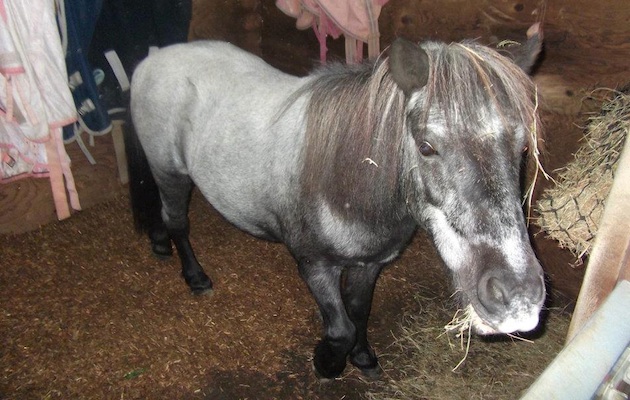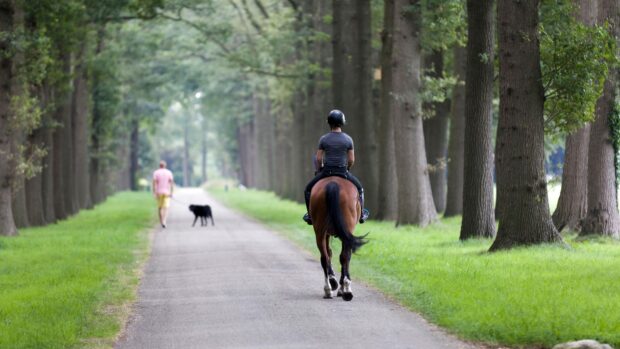All eight of a group of stolen miniature horses have now been reunited with their owner following a relentless search.
Palomino mare Barbie — the last to remain missing — was retrieved from a field on Sunday (July 30) following an anonymous tip-off via text.
The horses’ owner Jo Everett initially located Barbie on Saturday night.
“We drew maps with our best entrance and exit routes and the next morning I got my husband to drop me off, went down a big mud bank, ran across the field and just put my arms round her,” Jo explained. “I put a headcollar on and walked her two miles to where my friends were able to pick us up in a trailer and take her home.”
Jo, who breeds and shows the miniatures, told H&H her “knees buckled with grief” when she first discovered the horses were missing from her home in March, Cambridgeshire on July 12.
“A few of the horses had escaped [the thieves] and they just came running to me,” she said. “When I saw how little I had left I just couldn’t feel my legs — I fell to the floor screaming. I never thought I was the sort of person to be that dramatic.
“It took me two minutes to come to my senses. I got on Facebook straight away, as I knew social media would be the way to find them.”
The stolen horses included three-month-old Farada, without her mother, an elderly blind and deaf mare and two other foals — aged one week and two months — who remained with their dams.
Thieves cut through mains electric fencing to take the horses, who are thought to have been transported in the back of a “rusty” transit van.
The details of the missing horses were shared widely on Facebook, and on local TV and radio as well as H&H, and mare Salsa and her black filly foal — were discovered six days after the theft.
The following day, July 19, another five of the ponies were retrieved from common land with the help of a large police presence.
“Someone from Countryside Watch had phoned in and said they’d seen ponies tied up in long ragwort — they didn’t know they were ours and stolen,” Jo said.
Several of the horses — especially one stallion — appear to have been traumatised by their experience.
“He’s just been staring at the wall since he got back, we believe he was beaten,” Jo said. “The elderly mare has ligament damage from where she was hobbled too tightly. Most of them have cuts and bruises and skin missing from the hobbles.
“Farada was starved and exhausted and had a temperature from an infection — another day or two and she would probably have died. She’s now drinking synthetic milk as her mum’s had dried up but has started putting on weight,” she said. “Her mother has missing hair from whip marks where we think she tried to follow when they took her.”
Although she is very relieved to have the horses home, Jo says she is yet to feel any “joy”.
“I can link many things to the experience — disappointment, sadness, frustration, anger — but not joy. All I wanted was them back, but I’m almost finding it hard to understand they are here,” she said
“There was no reward for the people that took them. My animals have been damaged and I have £2,500 in vet’s fees to pay — there’s extra security to put in and the original damage to fencing to pay for. What did they get out of doing this? [The horses] were always worthless without their paperwork.”
Following a “mixed” response from the police — who Jo says were at times “very good” and at others “made her feel like she was looking for a table and eight chairs” —she is now fronting a campaign, with a petition, calling for a boost for rural policing.
A spokesman for Cambridgeshire police explained that vulnerable and high-risk incidents were given priority, and that because animals are classed as property in the eyes of the law, these incidents would not be classed as urgent.

Eight horses stolen overnight: devastated owner offers reward
A three-month-old foal and an elderly deaf and

Vigilance urged as horse thefts rise
Horse owners are being warned to be vigilant

‘Our family’s back together’: owners’ joy as stolen Shetland comes home
25-year-old mare Whisper had been taken from her
Chief constable Alec Wood said: “Demand for our services has never been higher and this is putting pressure on our control room and the front line. We remain committed to protecting the most vulnerable people and identifying those most at risk of harm when making demand decisions. This means we have to be realistic about what we can and cannot attend, and make some difficult decisions around resource management.
“The force has commissioned a local policing review to create a sustainable policing model for the next three to five years. Any savings made as a result will be reinvested into the front line to strengthen our ability to keep people safe and attack criminality.”
For all the latest news analysis, competition reports, interviews, features and much more, don’t miss Horse & Hound magazine, on sale every Thursday.




